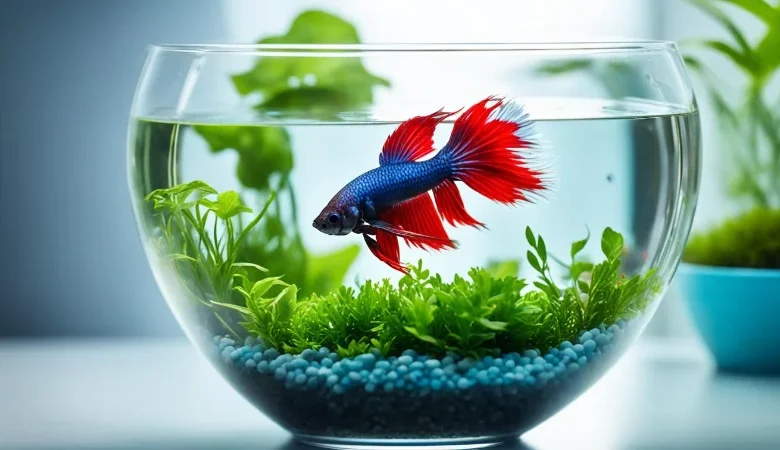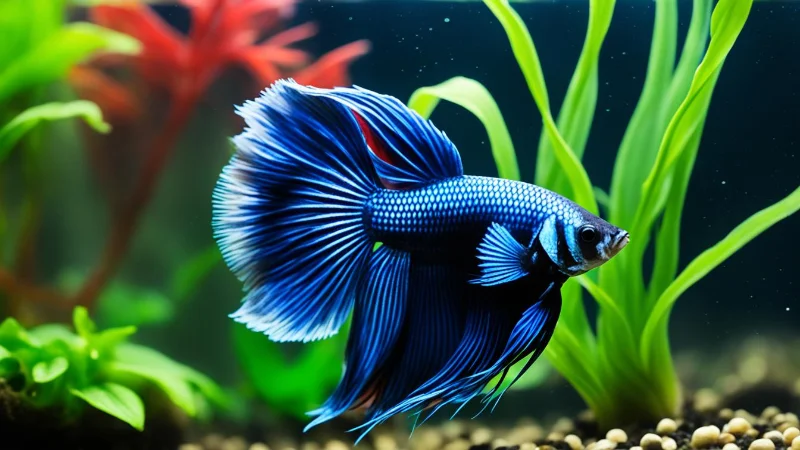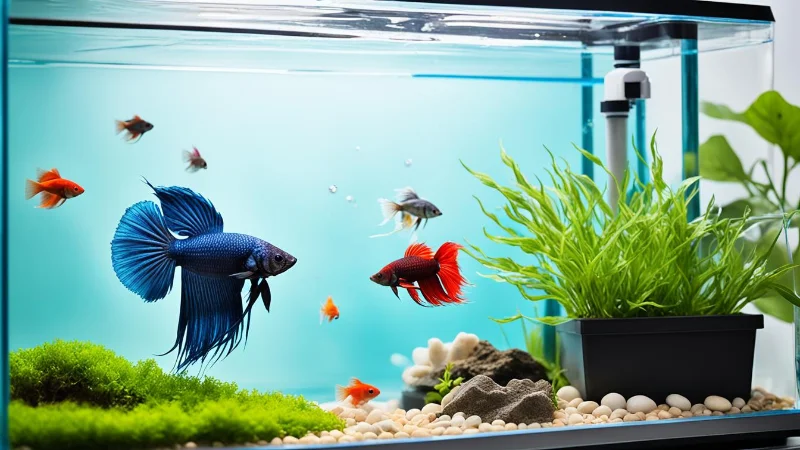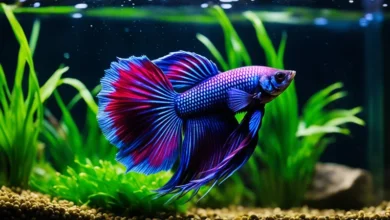
Are you thinking about getting a betta fish or already have one? Knowing the truth about caring for betta fish can make a big difference. Betta fish are very popular, but many myths have spread about them. In this piece, we’ll clear up the top 5 myths and give you the real facts. Let’s explore the truth together.
Introduction to Betta Fish Myths
Before covering the myths of betta fish, understanding them is key. Betta fish myths are wrong ideas about how to care for bettas. They cause problems like wrong care and misunderstanding needs. By clearing these up, we help betta fish get the right care they need.
False beliefs about betta fish can hurt them. It is vital to know what is true and what is not. Then, owners can learn to take the best care of their bettas.
Myth 1: Bettas Can Live in Tiny Bowls
There’s a myth that betta fish are happy living in small bowls. But this idea is not true.
The Origins of This Myth
This myth started because, in stores, bettas would be in small tanks. This made people think they could live happily in tiny spaces. Since then, many believe a small bowl is enough for them.
Why Tiny Bowls Are Harmful
Keeping bettas in small bowls is bad for them. Bettas need more than just air, they need a proper home. Small bowls lack space, clean water, and enough air. Small bowls get dirty fast, which can harm the fish. This leads to sickness and a shorter life for these pets.
Proper Tank Size for Bettas
Bettas need a bigger tank to be healthy. A 5-gallon tank is a good start for one betta. This gives them room to swim and a better living condition. A big enough tank lets you add filters, heaters, and lights. These make the bettas happier and healthier, showing off their beautiful colors and actions.
It’s important to know the truth about bettas and small bowls. This way, we can take better care of these amazing fish.
Myth 2: Bettas Don’t Need a Heater
Many think bettas don’t need a heater, but they do. Bettas need stable water temperature. It’s key to their health and happiness.
Understanding Betta Fish Natural Habitat
Betta fish come from warm places in Southeast Asia like Thailand. Their home waters are shallow and warm, about 78-80°F (25-27°C). In these conditions, bettas show their best colors and behaviors.
The Importance of Stable Water Temperature
Keeping the water temperature steady is a must. Big changes or extreme temps can hurt bettas. A good heater prevents this stress and sickness. A stable temp helps their body work well, keeps them active, and their immune system strong. This way, they can stay healthy and resist diseases better.
Choosing the Right Heater for Your Betta
Pick a heater based on your tank size, not just any will do. Look for ones with adjustable settings. This helps keep the right temp for bettas.
- You can choose from different kinds, like in-water or those that are set to a temp. Go for an in-water heater that you can adjust. It gives you more control.
- Make sure the heater fits the tank size. Little tanks need less power, big tanks need more. This makes sure the whole tank is warm enough.
With a good heater, your betta’s tank can feel just like their natural home. This is great for their health and makes them happier.
Myth 3: Bettas Can Survive on Plant Roots
Many people believe betta fish can live off plant roots alone. This is a myth. Bettas might nibble on plant roots in the wild, but that’s not enough for their needs.

The Misconception of Plant-Based Diets
Bettas are known to explore and forage plants in their natural homes. They might nibble on roots, but it’s not their main food source. This is more about checking out their environment than feeding on the roots.
Nutritional Needs of Betta Fish
For bettas to be healthy, they need a mix of high-quality protein, fats, vitamins, and minerals. Plants can be part of their diet, but not everything. The best diets for bettas include quality commercial pellets, some live or frozen foods, and treats like bloodworms.
Proper Betta Fish Diet
It’s best to give your betta fish a variety in their diet. Staples should include high-quality betta pellets. Add in some natural foods like freeze-dried options. Remember, don’t overfeed them, just enough that they can eat in a few minutes.
By showing how bettas need more than plant roots, we help them live well. A good diet is key to a betta fish’s health.
Myth 4: Bettas Are Too Aggressive to Have Tank Mates
Many think bettas are too mean for friends in their tanks. But bettas can live with others if you do it right. While they can be pushy at times, they can be calm with the right fish friends.
Understanding Betta Behavior
Bettas, known as Siamese fighting fish, like their space. Males can be up to 82% fierce towards others at first. They might even have little ‘chats’ with them. But, this tends to cool off in about 2 weeks.
Compatible Tank Mates for Bettas
Picking the right friends for bettas is crucial. Good fish friends can lead to a peaceful tank. Some friends that do well with bettas are:
- Small schooling fish: Neon tetras, harlequin rasboras.
- Bottom dwellers: Corydoras catfish, small Plecos.
- Non-aggressive mid-level swimmers: Guppies, mollies.
- Peaceful top-level swimmers: Endler’s livebearers, celestial pearl danios.
Always look at how big they get, how calm they are, and what water they like. This helps everyone get along.
Introducing Tank Mates to a Betta Tank
Bringing new fish into a betta’s home takes care. By doing it right, you keep the peace. Here’s how:
- Have lots of plants: Live plants and things like catalpa leaves make good hiding spots. They help lower fights.
- Let the betta lead: It’s best to let your betta get comfy first; then add the others a bit later.
- Watch them closely: Make sure the new fish and your betta get along. If anyone’s too grumpy, they might need their own space.
- Give everyone places to hide: More hiding spots mean less stress and fewer fights.
- Keep on the lookout: Watch how everyone acts together. Fix or change things if you see any trouble.
Each betta has a different friendship style. Some are cool with roommates, others not so much. With time and the right setup, many bettas and their friends can live happily together.
Myth 5: Bettas Are Low-Maintenance Pets
Many think Bettas are easy to care for, but the truth is different. Bettas are tough, yes, but they have specific needs that shouldn’t be ignored.

Here are some common misconceptions and the realities of Betta care:
- Tank size and setup: Some people mistakenly believe a small, filter-less bowl is enough. However, Bettas needs a spacious tank with a filter to keep the water clean and a heater to maintain the right temperature.
- Diet: It’s a mistake to think Bettas can live off plant roots. While this mimics the wild, it isn’t sufficient. Bettas thrive on a diet of quality pellets or flakes and occasionally enjoy treats like bloodworms or brine shrimp.
- Routine care: Taking care of your Betta means sticking to a routine. This includes regular water changes and monitoring water conditions like pH levels. Observing their behavior is also crucial.
Bettas need more care than many realize. They require the right tank, good food, and consistent effort. By understanding the true needs of Betta care, you can ensure your fish’s well-being and joy.
Benefits of Debunking Betta Fish Myths
Debunking myths about betta fish helps a lot. It corrects wrong ideas and shares the right ones. This makes caring for bettas better and their lives healthier.
Improving Betta Fish Care Practices
Challenging false beliefs about Betta fish helps owners provide better care, ensuring Bettas live healthier and happier lives.
Understanding that Bettas need more than a tiny bowl encourages owners to provide larger tanks, allowing Bettas to swim freely and stay healthy. Knowing they require warm water emphasizes the importance of using a heater to prevent illness and stress.
Dispelling the myth that Bettas can live on plant roots alone highlights the need for a varied diet to keep them strong and vibrant. Additionally, realizing that not all Bettas are too aggressive for tank mates opens the possibility for a more enriching and less lonely environment.
By correcting these misconceptions, we can significantly improve the quality of life for Betta fish.
Promoting Responsible Pet Ownership
Dispelling myths about Betta fish significantly improves our ability to care for them. Understanding their true needs allows us to provide better environments and ensures happier, healthier Bettas.
Being informed guides us in setting up proper homes for our Bettas, enhancing their quality of life and strengthening our bond with them. Knowing the facts and applying them leads to longer, healthier lives for our Betta fish, making us better pet owners.
Conclusion
In conclusion, debunking common myths about Betta fish is essential for their well-being. Contrary to popular belief, Bettas need spacious tanks, warm water, and consistent care. They thrive in larger tanks that mimic their natural habitats and require stable water temperatures provided by a heater. Investing in a slightly larger tank is both cost-effective and beneficial for their health.
Additionally, accurate information from pet stores about Betta care is crucial to prevent harm. Understanding these truths and maintaining proper tank conditions ensures that Bettas are happy, healthy, and thriving.



